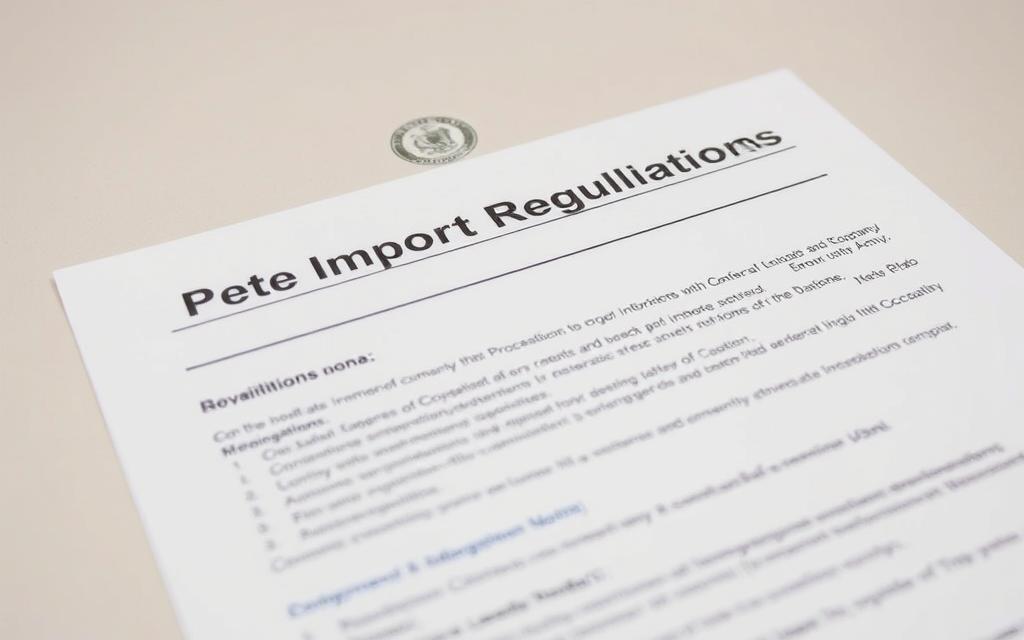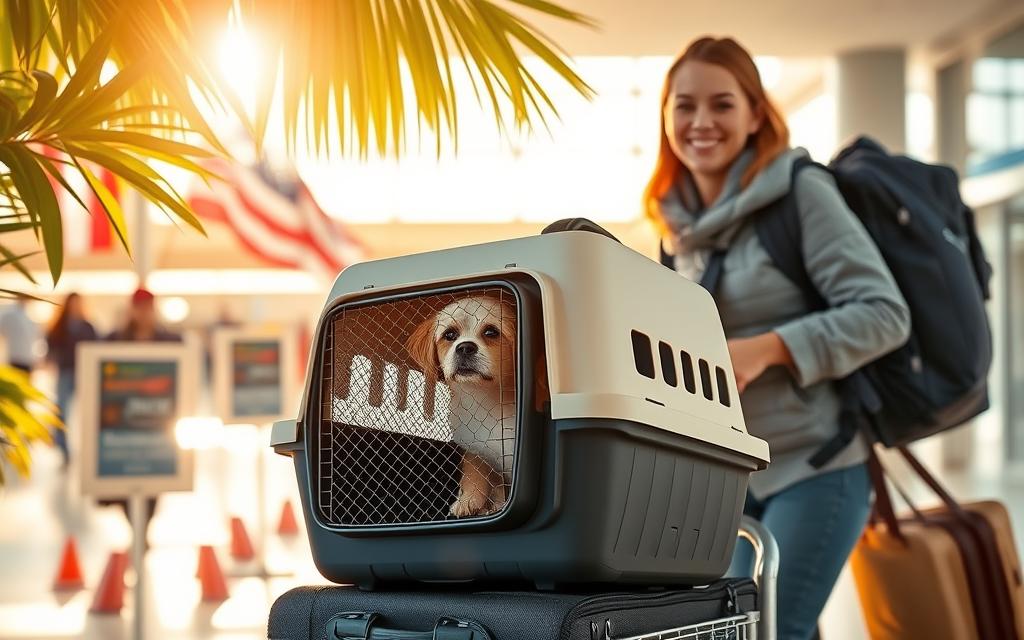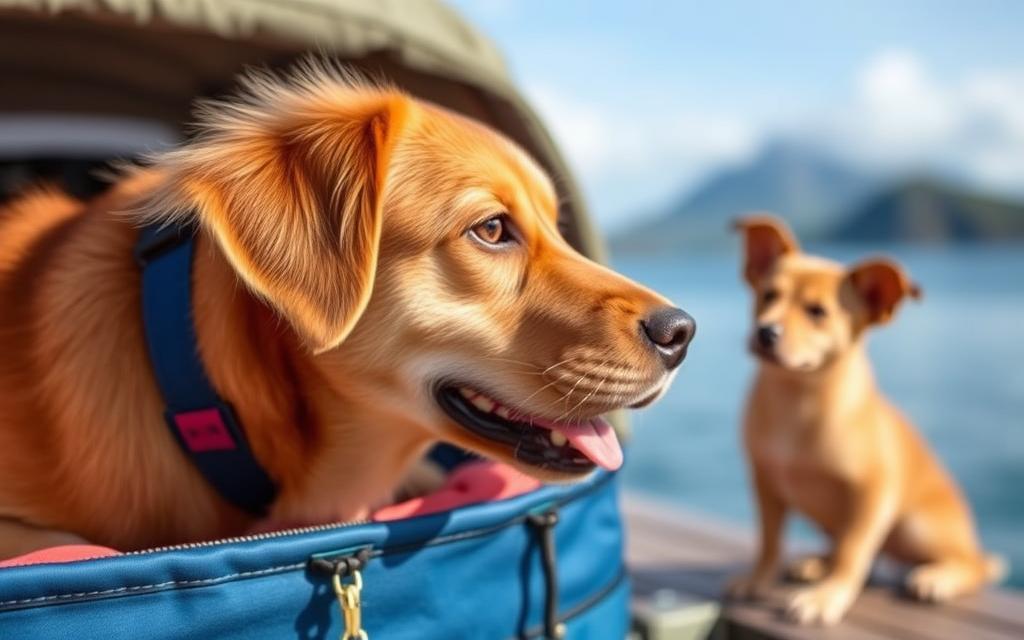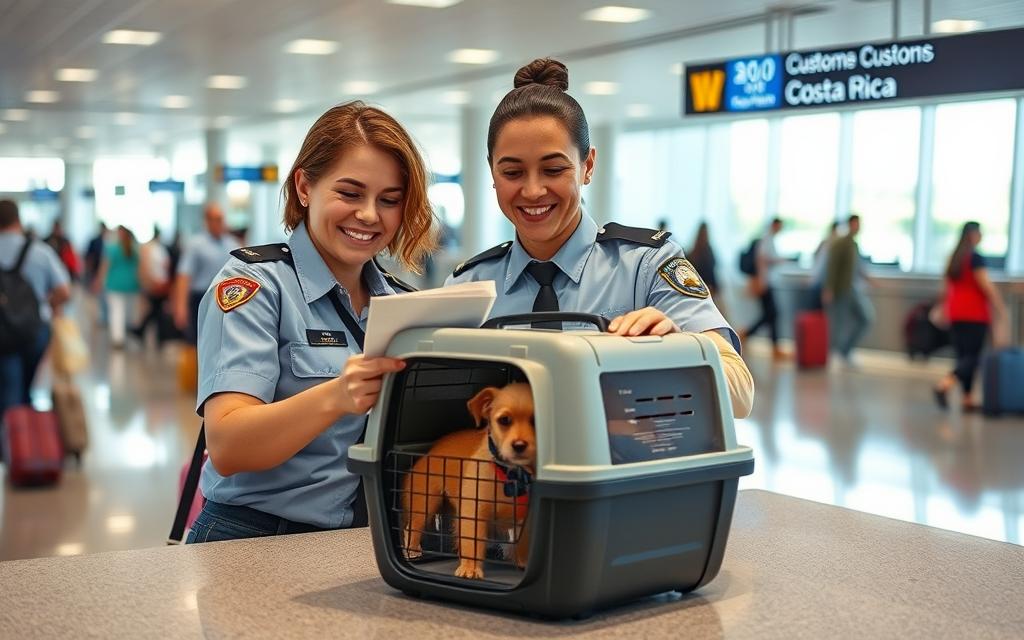How to Bring Pets to Costa Rica as a Resident: A Guide

Residency in Costa Rica has become an attractive option for individuals and families seeking a better quality of life. This Central American country is known for its natural beauty, mild climate, and rich culture, making it a desirable destination for those looking to settle permanently or temporarily.
We understand that relocating with your pets can be challenging. Our guide is designed to help you navigate the process of bringing your pets to Costa Rica, covering essential requirements and procedures for a smooth transition.
Costa Rica is a pet-friendly country, but it's crucial to follow the rules to ensure a hassle-free move. We'll walk you through the necessary steps, from obtaining health certificates to navigating customs upon arrival.
Understanding Costa Rica's Pet Import Regulations

To bring your pet to Costa Rica, it's essential to comprehend the country's import regulations and prepare the necessary documentation. The Costa Rican Ministry of Agriculture and Livestock has established specific requirements to ensure a smooth entry process for pets. These regulations are designed to prevent the introduction of diseases while ensuring the welfare of both imported pets and the local animal population.
Key Documentation Required for Pet Entry
The cornerstone of Costa Rica's pet import regulations is the requirement for a valid health certificate issued by a licensed veterinarian within 14 days of travel. This certificate must be endorsed by the appropriate government authority, such as the USDA APHIS for U.S. residents or CFIA for Canadian residents. For more information on the identification requirements that may be relevant to pet owners in Costa Rica, you can visit this guide on national identification cards.
Additional documentation includes proof of microchipping for identification purposes, which is mandatory for all pets entering Costa Rica. Import permits are also required in specific situations, particularly when pets are traveling as cargo or not accompanied by their owners on the same flight.
Health Certificate Requirements
The health certificate must include detailed information about your pet's vaccinations, treatments, and overall health status, with specific attention to rabies vaccination. The certificate must declare that your pet is healthy and free from diseases. It's crucial that all documentation is current and properly authenticated to avoid delays or potential quarantine situations at the border.
Understanding the difference between requirements for personal pets versus commercial imports is also crucial, as the rules differ significantly. By ensuring compliance with these regulations, pet owners can facilitate a smooth transition for their pets into Costa Rica.
Vaccination and Health Requirements for Pets

To bring your pets into Costa Rica, you'll need to adhere to the country's rigorous vaccination and health regulations. Ensuring your pets are healthy and comply with these rules is essential for a smooth relocation process.
Required Vaccinations for Dogs
Dogs entering Costa Rica must be vaccinated against specific diseases. These include rabies, distemper, hepatitis, leptospirosis, and parvovirus. It's crucial that these vaccinations are administered at the appropriate intervals before travel to ensure their effectiveness.
Required Vaccinations for Cats
Cats are also subject to strict vaccination requirements. They must be vaccinated against rabies, feline viral rhinotracheitis, calicivirus, panleukopenia, and feline leukemia. The rabies vaccination, in particular, must be administered at least 30 days before entry but not more than one year prior.
Parasite Treatment Guidelines
All pets must undergo parasite treatment within 15 days of travel to Costa Rica. This includes treatments for both internal and external parasites. Documentation of these treatments is mandatory and must include the product used, active ingredients, lot number, and date of administration.
For more information on the next steps after obtaining residency in Costa Rica, including how to navigate pet relocation, visit Jaros CR for detailed guidance.
How to Bring Pets to Costa Rica as a Resident

As a resident moving to Costa Rica, bringing your pet along requires careful planning and adherence to specific regulations. Unlike tourists, residents face a more complex process when importing pets, involving additional documentation and long-term considerations.
Special Considerations for Residents vs. Tourists
Residents need to consider several factors that are not as critical for tourists. For instance, residents must plan for long-term pet care, including finding a local veterinarian and establishing relationships with pet care providers. The documentation process for residents may also include extra steps, especially if you're importing multiple pets or planning an extended stay in Costa Rica.
Residents should research how their pets will adapt to Costa Rica's tropical climate and consider breed-specific needs. Some dog breeds, for example, may struggle with the heat and humidity in certain regions.
Long-Term Pet Import Planning
Long-term planning is crucial for a smooth transition when moving to Costa Rica with your pet. This includes researching pet-friendly housing options in your intended area of residence and establishing a timeline for the pet import process. Residents should allow sufficient time for vaccinations, health certificates, and any additional requirements specific to their pet's species or breed.
It's also essential to consider the potential need for return travel and maintain proper documentation for your pets should you need to leave Costa Rica temporarily or permanently. Understanding the differences in pet ownership culture between your home country and Costa Rica will help smooth the transition for both you and your pet.
Step-by-Step Process for Pet Relocation

When planning to relocate to Costa Rica with your pet, it's essential to understand the step-by-step process involved. This process ensures a smooth transition for both you and your pet.
Preparing Your Pet for Travel
Preparing your pet for travel is a crucial step in the relocation process. We recommend starting this process early to ensure your pet is comfortable and ready for the journey. Schedule a preliminary veterinary visit to discuss travel plans and ensure your pet is healthy enough for international travel. Microchipping your pet is also an essential step, as it provides permanent identification required for entry into Costa Rica. Additionally, prepare your pet for travel by gradually introducing them to their travel carrier and adjusting their feeding schedule to accommodate flight times.
Obtaining and Validating Required Documents
Obtaining the necessary documents is a critical part of the pet relocation process. To bring your pet to Costa Rica, you will need to obtain a health certificate from a USDA-approved vet within 14 days of travel. Ensure your pet has had a rabies vaccine at least 30 days before leaving, as Costa Rica only accepts a rabies vaccine given within the past year. It's also crucial to understand airline regulations regarding pet travel, including costs for carry-on, checked baggage, or cargo. For more information on the requirements for residency in Costa Rica, you can visit this resource.
Common Pitfalls to Avoid
Several common pitfalls can be avoided by being informed and prepared. Overlooking airline-specific requirements, failing to properly time the health certificate issuance, or neglecting to research breed-specific restrictions are common mistakes. Make copies of all documentation and keep both digital and physical versions accessible during travel. Prepare a travel kit for your pet that includes familiar items, sufficient food and water, and any necessary medications for the journey.
Pet Transportation Options to Costa Rica

For those moving to Costa Rica with their pets, understanding the available transportation options is crucial. We will explore the various methods to transport pets to Costa Rica, ensuring a smooth relocation for both you and your pet.
Flying with Your Pet as Carry-On
Small pets, typically those weighing under 15-20 pounds, can travel in the cabin as carry-on luggage. This option allows you to keep your pet close during the journey. However, it's essential to check with your airline regarding their specific requirements and costs, as well as ensuring your pet carrier meets their safety standards. For more information on pet travel regulations, you can visit relevant resources.
Checked Baggage vs. Cargo Options
Medium to large-sized pets usually travel as checked baggage in a pressurized, temperature-controlled cargo hold. This option may not be available during extreme weather conditions. For larger breeds or pets traveling separately from their owners, cargo shipping through the airline's freight service is an alternative, requiring additional documentation and coordination.
Ground Transportation Alternatives
For residents coming from North America, specialized pet transportation services offer ground transportation from the United States through Central America to Costa Rica. These services can handle the logistics, providing a stress-free relocation for your pet.
Choosing Pet-Friendly Airlines for Costa Rica Travel

The journey to Costa Rica with your pet begins with choosing a pet-friendly airline, a decision that impacts your pet's travel experience. As a resident, you're not just looking for any airline; you need one that understands and caters to your pet's needs.
Airline-Specific Pet Policies
Major airlines serving Costa Rica, such as American Airlines, United Airlines, and Delta, have distinct pet policies. For instance, American Airlines requires a reservation for pets traveling in-cabin to ensure no more than seven pets are booked on any single flight. Delta Airlines emphasizes reviewing health, kennel, and weather requirements on their website to keep pets safe. Specialized services like Perro Air offer dedicated flights for pets, providing a premium but stress-reducing option. When choosing an airline, consider their pet policy, including restrictions on breeds, carrier dimensions, and the maximum number of pets per flight.
Cost Comparison for Pet Travel
The cost of bringing pets to Costa Rica varies significantly depending on the airline and travel arrangements. In-cabin pets typically cost between $125-$200, while checked pets range from $200-$500. Cargo shipments can exceed $1,000, depending on size and weight. When comparing costs, consider additional expenses such as health certificates, required carriers, and potential overnight stays. For families with multiple pets, check if the airline offers discounts for additional animals. Researching reviews and incident reports can also help you make an informed decision, ensuring your pet's safe and comfortable journey to Costa Rica. For more information on residency in Costa Rica, visit Jaros CR.
Navigating Customs and Arrival Procedures

Upon arrival in Costa Rica, you'll need to clear customs with your pet, a process that requires preparation. The Costa Rica airport customs office operates only during normal business hours, Monday through Friday, so plan your arrival accordingly.
What to Expect at Costa Rican Customs
At Costa Rican customs, officials will inspect your pet's health certificate, vaccination records, and other required documentation. Keep these papers easily accessible in your carry-on luggage to streamline the process. A visual examination of your pet will be conducted to ensure they appear healthy and match the description in the documentation. Be prepared for potential delays, as the customs clearance process for pets can take several hours.
Post-Arrival Veterinary Requirements
After clearing customs, residents must take their pets to a Costa Rican veterinarian within 14 days for a follow-up examination and to establish veterinary care in the country. This visit is an opportunity to discuss local pet health concerns, such as tropical diseases and parasites. The veterinarian can provide guidance on adapting your pet's care routine to Costa Rica's climate and environment, including appropriate parasite prevention protocols. Make sure to ask for recommendations on local pet resources, including emergency veterinary services and pet-friendly areas.
Finding Pet-Friendly Housing in Costa Rica

As a pet owner moving to Costa Rica, it's essential to navigate the local real estate market with your furry friends in mind. Finding pet-friendly housing is a crucial step for residents bringing pets to Costa Rica, as rental policies regarding animals vary widely throughout the country.
Top Areas for Pet Owners
Popular areas for pet owners include Tamarindo, Playas del Coco, Arenal, Santa Teresa, and Manuel Antonio, which offer pet-friendly accommodations and access to outdoor spaces. When searching for housing, consider proximity to veterinary services, pet supply stores, dog parks, and pet-friendly beaches or hiking trails.
Negotiating Pet Terms with Landlords
When negotiating with landlords, be prepared to offer a pet deposit, provide references from previous landlords regarding your pet's behavior, or even arrange a meeting between your pet and the potential landlord. Many condominiums and gated communities in Costa Rica have specific pet policies, often limiting the number, size, or breed of pets allowed, so research these restrictions before committing.
Long-term residents might consider purchasing property rather than renting, as this provides more freedom regarding pet ownership and eliminates potential conflicts with landlords. Costa Rica's real estate market offers various pet-friendly housing options, from beachfront properties with fenced yards to mountain retreats with ample space for pets to roam.
Pet Care Resources for Residents in Costa Rica
As residents of Costa Rica, it's essential to have access to reliable pet care resources. Costa Rica has a lot to offer pet owners, including dog parks, pet-friendly beaches, doggy daycares, and great veterinary care.
Finding Qualified Veterinarians
Finding a qualified veterinarian who speaks your language is crucial for long-term pet health management in Costa Rica. Major cities like San José offer comprehensive veterinary services, and many veterinarians in tourist and expat-heavy areas speak English. For emergency situations, residents should identify 24-hour veterinary clinics near their home and save these contact details before an emergency occurs. You can find more information on Costa Rican residency processes on the Jaros CR website.
Pet Supplies and Services
Pet supply stores are readily available in urban and tourist areas, carrying familiar brands of pet food, medications, and accessories. Specialty services such as pet grooming, training, boarding, and daycare are increasingly available in Costa Rica, particularly in areas popular with expatriates. Community resources like pet owner groups on social media can provide valuable recommendations and support for new residents navigating pet care in Costa Rica.
Conclusion
With proper preparation, you can ensure a smooth transition for your pets when moving to Costa Rica. The process involves obtaining necessary health certificates, ensuring current vaccinations, and selecting the right transportation method. Costa Rica's pet-friendly culture and numerous resources make it an ideal destination for pet owners. You can enjoy exploring the country's beautiful landscapes with your pets, from pet-friendly beaches to hiking trails. Establishing a relationship with a local vet within the first two weeks of arrival is crucial. For more information on relocating to Costa Rica, you can visit Jaros CR for guidance on the relocation process. By following these steps, you and your pets can enjoy the "pura vida" lifestyle that Costa Rica is known for.


